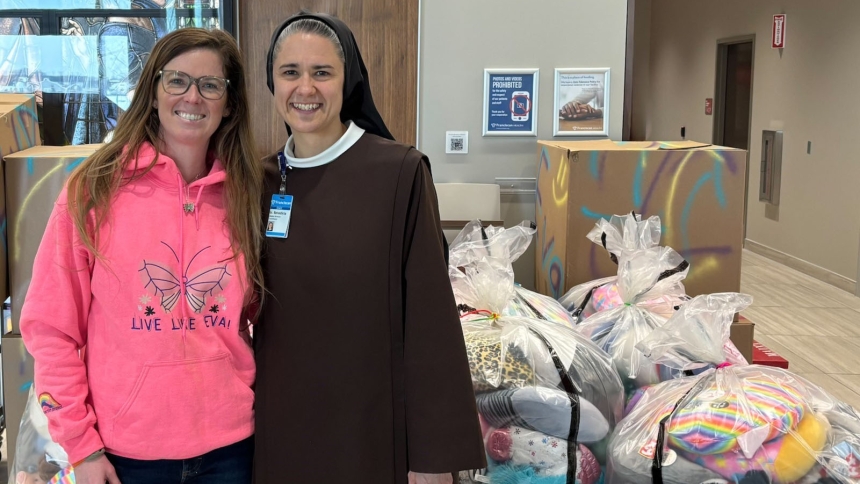
As published in the Northwest Indiana Catholic on October 28, 2018
On October 14, Pope Francis canonized as saints Mother Mary Kasper, the foundress of the religious order, The Poor Handmaids of Jesus Christ, Pope Paul VI and Archbishop Oscar Romero. This triptych of sanctity reveals the ever-varied possibilities of holiness available to us as we seek our own spiritual path as missionary disciples of the Lord Jesus.
Catherine Kasper was born in 1820 in Germany of poor peasants with a deep religious faith. Because of frequent childhood illnesses, her formal schooling only added up to about two years in total. When she was 21, her father died and she hired herself out for work at ten cents a day to support her family.
Already as a youth, Catherine was unusually compassionate to the needs and sufferings of the poor and sick in her village, performing works of service and love for them. Other women, inspired by Catherine’s example, began to do the same, and soon an Association of Charity was formed.
Responding to the promptings of a voice within, Catherine built a little house where she could devote herself to prayer, meditation and service to the poor and sick. Eventually, four women joined her who became the nucleus of a new religious congregation which Catherine named the Poor Handmaids of Jesus Christ in imitation of the obedience and service of the Blessed Virgin Mary.
This order spread throughout the world, as the sisters dedicated themselves to serving in hospitals, orphanages, schools and wherever the poor and sick needed to know the merciful presence of God. Here in the Diocese of Gary, we have been blessed with the long-time presence of the Poor Handmaids in so many of our institutions.
I am so grateful for their legacy of merciful and transformative service; I think of our schools, St. Catherine and St. Mary hospitals, Sojourner Truth House, Nazareth Home, and so many other good works that continue to flourish under the loving care of the sisters.
Congratulations, Poor Handmaids on the canonization of Mother Kasper! We are all blessed by your service and example!
Giovanni Battista Montini was born in Brescia in northern Italy in 1897; his father was a prominent journalist. Ordained a priest at a very young age, Montini served principally in the Vatican Secretariat of State from 1922-1954, becoming a principal advisor to Pope Pius XII.
During World War II, he effectively ran a remarkable Missing Persons network at the Vatican, helping millions of people displaced by the war to find missing loved ones. Montini was made the Cardinal-Archbishop of Milan, the largest Italian diocese with hundreds of parishes and institutions, in 1954 and exemplified a pastoral zeal and sensitivity which renewed the life of the local Church. Pope John XXIII named him a cardinal in 1958, and in 1963, Montini succeeded John as pope, taking the name Paul VI.
Pope Paul had the daunting challenge of finishing the Second Vatican Council, inaugurated by his predecessor and implementing its many reforms and changes. This effort required much balance, wisdom and patience as some leaders in the Church wanted radical changes not mandated by the council and others wanted no substantial changes at all. Paul tried to steer a middle course, initiating liturgy in the vernacular with the priest facing the people, establishing the Synod of Bishops, re-establishing the permanent diaconate and emphasizing the role of the laity in the mission of the Church.
He reaffirmed priestly celibacy, the Church’s prohibition of artificial contraception and traditional devotions. He was the first modern pope to travel, making trips to Israel, Colombia, Fatima, the United Nations and the Philippines.
Pope Paul VI was a gentle, holy, prayerful man who struggled much in the aftermath of Vatican II. He died on August 6, 1978, the Feast of the Transfiguration at the age of 80.
Oscar Romero was a priest in El Salvador, born in 1917, formed in a traditional environment of deep piety and rich faith. He was shy and quiet, yet deeply loved the Lord and served his flock with devotion and generosity.
Consecrated a bishop in 1970, Romero saw the economic and political oppression which his people suffered at the hands of the rich oligarchs who ran the government and the military, keeping the campesinos in a desperate state of poverty and suffering. As some leaders in the Church began to condemn the injustice, other bishops and priests took the side of the rich and powerful.
In the midst of this tension, Romero became the Archbishop of San Salvador in 1977. As he witnessed the torture and murder of priests, sisters and lay leaders who spoke and advocated of the poor, his timidity gave way to a bold and apostolic courage, which led to strong condemnations of the injustices inflicted upon his people.
Faced with escalating death threats and violence, Romero used a weekly radio program to reach his people with the liberating message of the Gospel until he was murdered while celebrating Mass on March 24, 1980 by a government soldier. His martyrdom galvanized his people to continue the struggle for freedom and justice. Romero stands today as a courageous voice for all those who suffer the violation of their fundamental human rights.
These three witnesses show us very different paths of following the Lord Jesus as disciples. Each observed the needs around them, discerned God’s will and boldly put it into practice. We are called to do the same.
+ Donald J. Hying



